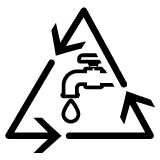Challenges
Solid waste management (SWM) is a growing challenge worldwide, especially in developing countries as a result of the rapid increase in waste generation caused by increasing population levels, booming economies and rapid urbanization and industrialization. Authorities for urban waste management are tasked to provide effective and efficient waste management systems for residents in their cities. However, they often face problems beyond their capabilities, which mainly has to do with the systems’ complex and multi-dimensional nature, and the lack of financial, human, infrastructural, and related resources to develop effective SWM systems. At a global scale, the generation of waste has doubled over the last two decades and the majority of it is still landfilled or incinerated, causing direct greenhouse gas (GHG) emissions. Nowadays, concerns about inappropriate management have led to efforts to reorient and upgrade SWM systems so that sustainability can be achieved.
GFA approach and services
 © © Cylonphoto | istockphoto
Sustainable resource utilization and SWM are global challenges. From state-of-the-art technologies for recovering resources to practices that make landfills less harmful to human health and the environment, GFA´s in-depth experience with both public and private sector clients worldwide makes for a thorough understanding of problem-oriented solutions across a wide range of contexts.
© © Cylonphoto | istockphoto
Sustainable resource utilization and SWM are global challenges. From state-of-the-art technologies for recovering resources to practices that make landfills less harmful to human health and the environment, GFA´s in-depth experience with both public and private sector clients worldwide makes for a thorough understanding of problem-oriented solutions across a wide range of contexts.
The GFA approach aims at providing innovative tools and approaches to the governance and implementation of integrated waste management. The company provides technical, financial and strategic expertise to SWM stakeholders at different levels. This contributes to the improvement of waste management services and the integration into a circular economy.
GFA services seek to improve the human, institutional and administrative capacities of relevant local, regional and national administrations for the implementation of integrated and job-creating SWM. This include the development and implementation of communication and awareness-raising strategies, pragmatic recycling solutions, strategies regarding the increase of waste recovery rates, and the integration of the circular economy. In its work, GFA strives to facilitate close cooperation and interaction between different actors such as civil society, the private sector and specialist scientists. Putting an emphasis on holistic designs in all its services, GFA has anchored a climate change focus in its organizational structure through the Climate and Energy Cluster and its attached inter-departmental technical working groups.
For a successful and sustainable SWM system, a combination of modern technologies and local expertise is required. To this end, GFA promotes waste prevention and reduction, and waste separation as preferred practices in designing and implementing sustainable SWM systems. Beyond its technical know-how, GFA fosters a multitude of key services needed to safeguard a successful outcome, which include but are not limited to:
- Assisting strategic waste management planning and follow-up implementation: In order to use limited resources most effectively, GFA assists the design of SWM plans at national, regional and local levels, and provides support to follow up on their implementation, e.g. solid waste plans for different municipalities in Albania.
- Legal and institutional aspect: GFA assists national and local governments in upgrading and implementing new policies, strategies, regulations and legal frameworks for efficient SWM practices.
- Developing financing schemes: GFA supports relevant authorities to transform their SWM systems to more self-financing programs and to develop measures that reduce and recover expenditures while increasing revenues.
- Awareness raising: Communication, education and public awareness (CEPA) and community participation are key elements in waste management and form a crucial part of any successful integrated SWM strategy. With our longstanding experience in CEPA actions, GFA supports sustainable behavior change, which is the only way to establish integrated SWM practices that e.g. include separation at source.
- Human resources and human capacity development: As continuously strengthening human resources is key to successful sustainable SWM, GFA fosters in-house capacities and skills with waste management institutions.
WASTE AND CIRCULAR ECONOMY
 © © OperationShooting | istockphoto
Circular economy consider the limitations on natural resources by recycling and resource efficiency. The circular economy concept involves a systemic change away from linear economies that are built on take-make-waste principles. By involving innovation and technology systems, but also policies, society, business models and finance, GFA develops adapted circular economy concepts and strategies for developing countries in cooperation with local governments and waste sector institutions. GFA assists the latter in setting up and implementing new business models, and in creating value for the circular economy. The company’s vast expertise in inter-connected sectors provides for the technical knowledge and holistic view required to guide and intervene with private and public organizations, helping them face the challenges involved in the transition from a linear to a circular economy. In this respect, GFA has developed a vision to address all the levers of a circular economy, whether at the product or territorial level.
© © OperationShooting | istockphoto
Circular economy consider the limitations on natural resources by recycling and resource efficiency. The circular economy concept involves a systemic change away from linear economies that are built on take-make-waste principles. By involving innovation and technology systems, but also policies, society, business models and finance, GFA develops adapted circular economy concepts and strategies for developing countries in cooperation with local governments and waste sector institutions. GFA assists the latter in setting up and implementing new business models, and in creating value for the circular economy. The company’s vast expertise in inter-connected sectors provides for the technical knowledge and holistic view required to guide and intervene with private and public organizations, helping them face the challenges involved in the transition from a linear to a circular economy. In this respect, GFA has developed a vision to address all the levers of a circular economy, whether at the product or territorial level.
For more information on the company’s circular economy approach and services, download our factsheet (PDF).
Contact
 Afrim Kalanderi
Afrim Kalanderi
Department Director Water, Sanitation and Waste Management
E-mail: afrim.kalanderi[at]gfa-group.de
Dr. Karima Hamouda
Senior Consultant Water, Sanitation and Waste Management Department
E-mail: karima.hamouda[at]gfa-group.de







